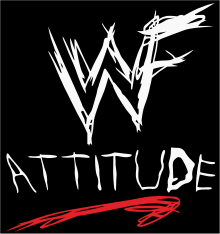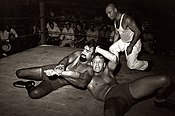
Back Attitude Era Spanish Ère Attitude French Attitude Era Italian Attitude Era Dutch Attitude Era Portuguese The Attitude Era SIMPLE ยุคแอตติจูด Thai

| Part of a series on |
| Professional wrestling |
|---|
 |
The Attitude Era was a major era of professional wrestling within the World Wrestling Federation (WWF, now WWE). The term "WWF Attitude" was used to describe its programming from November 9, 1997, to May 6, 2002. It began during the Monday Night War, a period in which WWF's Monday Night Raw (later Raw Is War) went head-to-head with World Championship Wrestling's (WCW) Monday Nitro in a battle for Nielsen ratings each week from September 4, 1995, to March 26, 2001. The era officially started on November 9, 1997, at Survivor Series 1997, when a video package aired ending with the first use of the "WWF Attitude" scratch logo;[1] this was immediately before the main event featuring Bret Hart vs. Shawn Michaels, which retrospectively would be known as the Montreal Screwjob due to the match's controversial finish. WWF's programming in this era featured adult-oriented content, which included increased depicted violence, profanity, and sexual content. This era was part of a wider surge in the popularity of professional wrestling in the United States and Canada as television ratings and pay-per-view buy rates for the WWF and its rival promotions saw record highs.
The Attitude Era marked the rise of many WWF wrestlers, including The Rock, Stone Cold Steve Austin, Chris Jericho, Triple H, Kane, Mick Foley (in various personas), Kurt Angle, and The Undertaker (who was already a veteran but continued to gain popularity).[3] The Steve Austin–Vince McMahon feud was one of the longest-running and most prominent rivalries of the era.[4] The WWF Women's Championship, which had lain dormant since December 13, 1995, was reactivated on September 15, 1998. While most of the company's female talent, such as Sable, Sunny and Stacy Keibler during this time period were marketed as sex symbols booked in sexually provocative gimmick matches (e.g., "bra and panties", bikini, lingerie, etc.) in an effort to draw more male viewership, prominent female stars such as Chyna, Lita, and Trish Stratus among others were presented as serious wrestlers.[5] WWF also signed a number of wrestlers who left WCW during this period, including Chris Jericho and the Big Show.[6]
The era also saw the resurgence of tag team wrestling, namely The Hardy Boyz, The Dudley Boyz, and Edge & Christian, who were featured in several destructive, physical and stunt-filled Tables, Ladders and Chairs matches during this era. Distinguished stables were established in this era, such as D-Generation X, Nation of Domination, The Corporation, Ministry of Darkness, Corporate Ministry and The Brood, among others, and developed major rivalries among each other. The Hardcore Championship was established on November 2, 1998, and this chaotic division involved no disqualification, falls count anywhere matches that would start and then would be taken outside the ring, with blunt weapons involved.[7] The Attitude Era drew to a close on May 6, 2002, as WWF changed its name to WWE and ceased using "WWF Attitude" branding,[2] leading into the Ruthless Aggression Era.[8]
- ^ a b "First WWF Attitude promo at Survivor Series 1997". YouTube.
- ^ a b "World Wrestling Federation Entertainment drops the 'F'!". WWE. May 6, 2002.
- ^ Hau Chu (December 18, 2015). "Where are they now? WWE Attitude Era superstars". New York Daily News.
- ^ Mueller, The Doctor Chris. "Power Ranking Stone Cold Steve Austin's 6 WWE Championship Victories". Bleacher Report.
- ^ "Bruce Prichard Says Attitude Era Women Were Mostly Comfortable With Bra & Panties Matches, Says They Wanted to 'Show Off Their Body'". 411mania.com.
- ^ "10 WCW Stars That Walked Out On The Company (And Why They Did It)". 26 June 2019.
- ^ "From Federation to Entertainment, WWE's Journey is Mirrored in Wrestling Games". NDTV Gadgets 360. 6 January 2015.
- ^ Cite error: The named reference
Smackdownhotelwas invoked but never defined (see the help page).
© MMXXIII Rich X Search. We shall prevail. All rights reserved. Rich X Search